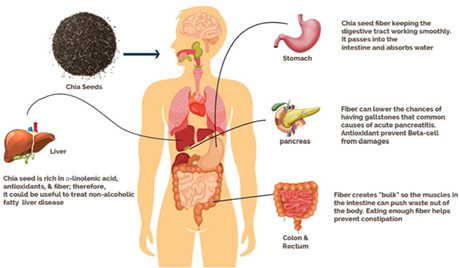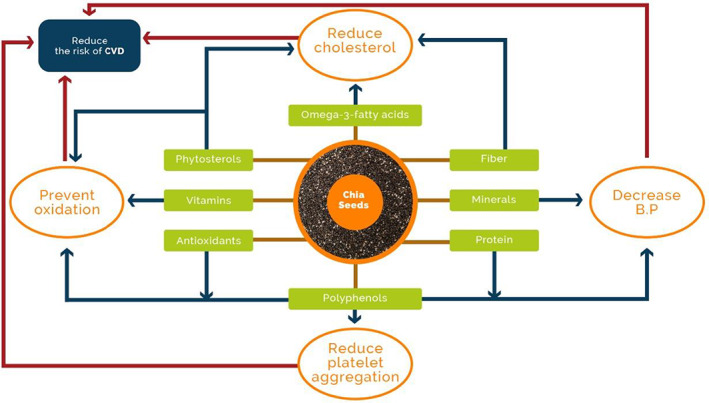Maximize Your Health with Chia Seeds: A Natural Remedy for Metabolic Wellness
Chia seeds (Salvia hispanica L.) are gaining recognition as a powerful functional food. Their rich nutrient profile offers therapeutic potential for managing metabolic disorders and promoting overall well-being.
What Makes Chia Seeds a "Therapeutic Weapon?"
Chia seeds contain various beneficial components, including fiber, polyphenols, antioxidants, omega-3 fatty acids, vitamins, minerals, and peptides.
- Nutrient Powerhouse: Packed with vegetable protein, unsaturated fats, carbohydrates, and ash.
- Versatile Health Benefits: These components contribute to cardiovascular health, improved digestion, and potential cancer prevention.

The Origins and Evolution of Functional Foods
Functional foods represent a blend of nutrition, food science, and medicine.
- Japanese Innovation: The concept originated in Japan in 1984.
- Definition: Foods offering health benefits beyond basic nutrition.
- Two Categories: Conventional and genetically modified foods, each with unique advantages.
Unpacking the Nutritional Composition of Chia Seeds
These small seeds offer a remarkable array of nutrients. Chia seeds are small, oval-shaped seeds with a gray color and black and white stains, typically around 2 millimeters (0.08 inches) wide.
- Botanical Background: Belonging to the mint family (Lamiaceae), native to Mexico and Guatemala.
- Seed Types: Available in black and white varieties, each with slightly different properties. Modern cultivation leans toward black chia seeds because of their productivity.
- Key Components: Rich in vegetable protein, lipids, carbohydrates, and dietary fiber, each contributing to overall health.
Table: Nutritional Composition of Chia Seeds (per 100g)
| Nutrient | USDA (2018) |
|---|---|
| Protein (g) | 16.5 |
| Fat (g) | 30.7 |
| Carbohydrate (g) | 42.1 |
| Dietary Fiber (g) | 34.4 |
| Energy (Kcal) | 480 |
Exploring the Functional Components for Better Health
Chia seeds boast several functional components, each providing unique health benefits.
1. Fiber: The Digestive Powerhouse
Fiber, an insoluble carbohydrate from plants, plays a crucial role in digestive health.
- Types of Fiber: Includes soluble and insoluble forms, each with distinctive benefits.
- Chia's Fiber Advantage: Chia seeds contain approximately 40% fiber, promoting healthy bowel movements and cholesterol reduction.
- Gut Health: The gel-forming fiber in soaked chia seeds aids stool movement, regulates blood sugar, and supports weight management.
2. Antioxidants: Protecting Against Cell Damage
Antioxidants help defend the body against harmful free radicals.
- Cellular Protection: Shielding cells from damage linked to cancer and other chronic diseases.
- Pancreas Support: Protecting beta cells in the pancreas, which is crucial for diabetes management.
3. Polyphenols: Fighting Inflammation and Disease
Polyphenols contribute to overall wellness by reducing inflammation.
- Disease Prevention: Potential benefits in preventing cancer and Alzheimer's disease.
- Anti-Inflammatory Properties: Supporting the body's natural defense mechanisms.
4. Vitamins: Essential for Overall Health
Chia seeds provide essential vitamins that support various bodily functions.
- Vitamin E: Known for its antioxidant properties. Protecting cells from damage is pivotal in cancer prevention.
5. Minerals: Supporting Vital Body Functions
Minerals are crucial for maintaining overall health and wellness.
- Blood Pressure Regulation: Contributing to reduced blood pressure levels.
- Overall Wellness: Supporting various bodily functions and maintaining balance.
6. Omega-3 Fatty Acids: Promoting Heart Health
Omega-3 fatty acids offer significant cardiovascular benefits.
- Cholesterol Management: Helping to reduce "bad" cholesterol (LDL) and triglycerides.
- Heart Health: Promoting overall cardiovascular wellness.
Table: Functional Components of Chia Seeds and Their Health Benefits
| Component | Benefits |
|---|---|
| Fiber | Diabetes, CVD, Constipation |
| Antioxidants | Cancer, Diabetes |
| Polyphenols | Cancer, Alzheimer's |
| Vitamins (E) | Cancer |
| Minerals | Reduces BP |
| Omega-3 Fatty Acids | Reduces bad cholesterol and triglycerides |

Chia Seeds and Their Impact on Metabolic Disorders
Chia seeds offer significant therapeutic potential for several metabolic conditions.
1. Cardiovascular Disease (CVD)
Chia seeds can improve various risk factors associated with CVD.
- Blood Pressure Reduction: Helping to lower high blood pressure levels.
- Cholesterol Control: Aiding in the reduction of harmful cholesterol levels.
- Platelet Regulation: Influencing platelet aggregation, which can reduce the risk of blood clots.
2. Gastrointestinal Tract (GI) Diseases
Chia seeds can alleviate symptoms and improve overall GI health.
- Blood Glucose Regulation: Fiber content helps in managing blood sugar levels, which is crucial for diabetes management.
- Constipation Relief: Providing bulk to stool and promoting healthy bowel movements.
3. Cancer Prevention
Antioxidants and polyphenols in chia seeds may offer protection against cancer.
- Cell Protection: Protecting cells from damage that may lead to cancer development.
- Cancer Types: Potential benefits against breast, colorectal, liver, and pancreatic cancers.
Incorporating Chia Seeds into Your Diet
Adding chia seeds to your diet is easy and versatile.
- Smoothies: Blend them into your morning smoothie for added nutrients.
- Yogurt or Oatmeal: Sprinkle them on yogurt or oatmeal for extra fiber and crunch.
- Baking: Incorporate them into baked goods for a nutritional boost.
- Puddings: Create a simple chia seed pudding by soaking them in milk or a milk alternative.
Conclusion: Embracing Chia Seeds for Enhanced Wellness
Chia seeds offer a versatile and effective way to promote metabolic health. Incorporating these tiny seeds into your daily diet can provide significant benefits for cardiovascular health, digestive wellness, and overall disease prevention. Embrace the power of chia seeds and unlock a healthier, more vibrant you.











%3Amax_bytes(150000)%3Astrip_icc()%2Fsuperfood-bites_0_0-bca6e3106e9c4f4ab59ab3f61964e155.jpg&w=3840&q=75)



